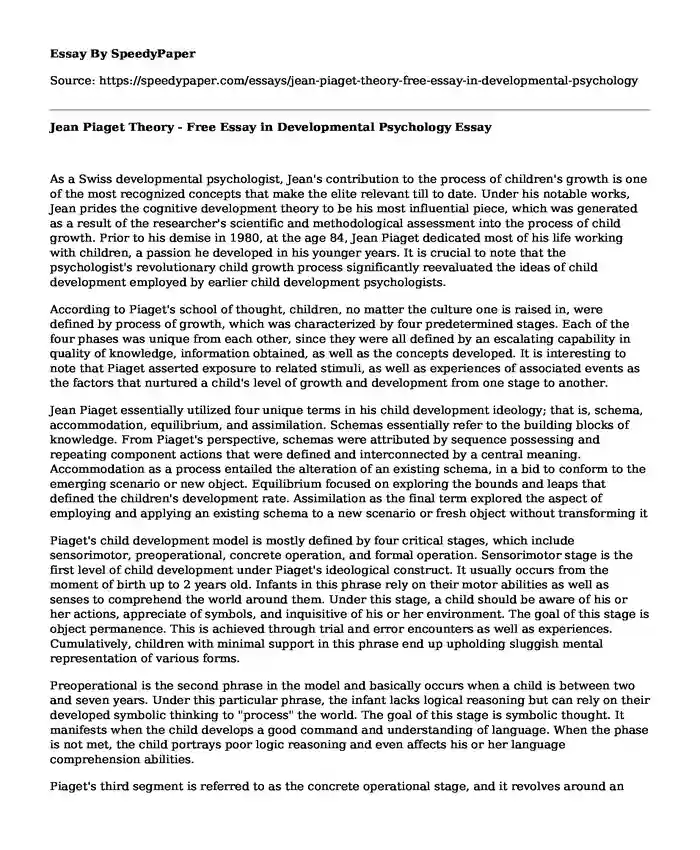
| Type of paper: | Essay |
| Categories: | Child development |
| Pages: | 3 |
| Wordcount: | 820 words |
As a Swiss developmental psychologist, Jean's contribution to the process of children's growth is one of the most recognized concepts that make the elite relevant till to date. Under his notable works, Jean prides the cognitive development theory to be his most influential piece, which was generated as a result of the researcher's scientific and methodological assessment into the process of child growth. Prior to his demise in 1980, at the age 84, Jean Piaget dedicated most of his life working with children, a passion he developed in his younger years. It is crucial to note that the psychologist's revolutionary child growth process significantly reevaluated the ideas of child development employed by earlier child development psychologists.
According to Piaget's school of thought, children, no matter the culture one is raised in, were defined by process of growth, which was characterized by four predetermined stages. Each of the four phases was unique from each other, since they were all defined by an escalating capability in quality of knowledge, information obtained, as well as the concepts developed. It is interesting to note that Piaget asserted exposure to related stimuli, as well as experiences of associated events as the factors that nurtured a child's level of growth and development from one stage to another.
Jean Piaget essentially utilized four unique terms in his child development ideology; that is, schema, accommodation, equilibrium, and assimilation. Schemas essentially refer to the building blocks of knowledge. From Piaget's perspective, schemas were attributed by sequence possessing and repeating component actions that were defined and interconnected by a central meaning. Accommodation as a process entailed the alteration of an existing schema, in a bid to conform to the emerging scenario or new object. Equilibrium focused on exploring the bounds and leaps that defined the children's development rate. Assimilation as the final term explored the aspect of employing and applying an existing schema to a new scenario or fresh object without transforming it
Piaget's child development model is mostly defined by four critical stages, which include sensorimotor, preoperational, concrete operation, and formal operation. Sensorimotor stage is the first level of child development under Piaget's ideological construct. It usually occurs from the moment of birth up to 2 years old. Infants in this phrase rely on their motor abilities as well as senses to comprehend the world around them. Under this stage, a child should be aware of his or her actions, appreciate of symbols, and inquisitive of his or her environment. The goal of this stage is object permanence. This is achieved through trial and error encounters as well as experiences. Cumulatively, children with minimal support in this phrase end up upholding sluggish mental representation of various forms.
Preoperational is the second phrase in the model and basically occurs when a child is between two and seven years. Under this particular phrase, the infant lacks logical reasoning but can rely on their developed symbolic thinking to "process" the world. The goal of this stage is symbolic thought. It manifests when the child develops a good command and understanding of language. When the phase is not met, the child portrays poor logic reasoning and even affects his or her language comprehension abilities.
Piaget's third segment is referred to as the concrete operational stage, and it revolves around an actual and more profound methodical and logical manipulation of symbols. Under this category, which runs from seven to eleven years, children can distinguish truths from fantasies, as well as the employment of deductive and inductive reasoning. Notably, the goal of this stage is to shed off the egocentrism traits, which defined the child during the younger phases as well as the development of operational thought. Children who miss this stage tend show sluggishness in development of ideas.
The final stage of Piaget's review is referred to as the formal operational stage. It essentially explores the ability of a child utilizing logical, abstract, and formal reasoning as crucial elements whenever he or she is assessing on his or her environment. The formal operational stage occurs from twelve years up to adulthood, an aspect that denotes of its impact in the development of moral and mature reasoning. In the given stage, children can explore possibilities through the development of a hypothesis, elements that make the grasp of abstract concepts as the primary goal of this stage. Those who miss this stage portray low reasoning abilities, and poor use of logic.
In conclusion, Piaget's ideology of growth has been influential and invaluable within the realms of child development. As a construct, the theory guided the direction used by most educators as well as parents in designing teaching and parenting tactics for their little ones. I agree with the theorist on the activities that take place at each particular phase. The proposed development stages, when applied correctly, would ensure that the teacher only plays a supportive role in guiding the kids, as they construct their perceived realms of the world.
Cite this page
Jean Piaget Theory - Free Essay in Developmental Psychology. (2022, May 31). Retrieved from https://speedypaper.net/essays/jean-piaget-theory-free-essay-in-developmental-psychology
Request Removal
If you are the original author of this essay and no longer wish to have it published on the SpeedyPaper website, please click below to request its removal:
- How Do I Find Inspiration for Essay Writing - Essay Example
- Essay Sample on British Apple Market
- The Global Economy Reserach, Free Essay Sample for Students
- Free Essay on The Yom Kippur War 1973
- Essay Example on TEC and ERP Systems
- Free Essay with a Briefing Note to Improve the Quality of Lives of the Elderly Who Live Alone
- Essay Sample on Media Convergence
Popular categories




